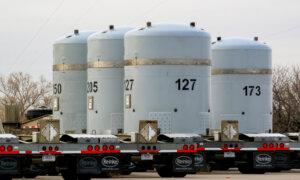The Fifth Circuit held that a federal agency lacks legal authority to license an interim waste storage facility.
The U.S. Supreme Court considered on March 5 whether the Nuclear Regulatory Commission (NRC) may authorize a private company to store spent nuclear fuel at a Texas site.
In the case, the court ordered two similar lawsuits—NRC v. Texas and Interim Storage Partners LLC v. Texas—to be considered together.
The statute stipulated that Yucca Mountain in Nevada would be the location of an underground facility for storing nuclear waste and directed the U.S. Department of Energy to start storing waste from states at the facility beginning in 1998.
The department was unable to meet the 1998 deadline. In addition, the proposed facility, formally called the Yucca Mountain Nuclear Waste Repository, faced opposition in Nevada, according to the petition.
In 2008, the department filed its license application for the Yucca Mountain facility with the NRC.
The commission “shut down its review and consideration” of the license application and admitted it “had no intention of reviewing the application, even though the Nuclear Waste Policy Act mandates a decision be made within three years of submission,” the petition said.
The Obama administration created the Blue Ribbon Commission on America’s Nuclear Future, which concluded that instead of dictating that nuclear waste may only be stored at Yucca Mountain, “a consent-based approach to siting nuclear waste storage facilities” was preferable, the petition said, meaning the facilities should be placed in jurisdictions that wanted them.
Years after the advisory commission’s report, in September 2021, the NRC gave Interim Storage Partners LLC (ISP) a license to operate an interim storage facility in Andrews County, Texas, which borders New Mexico.
The facility site is located in the Permian Basin, the nation’s most productive oil field.
Texas challenged the license in court.
The U.S. Court of Appeals for the Fifth Circuit invalidated the license in August 2023, finding federal law does not authorize the NRC to give a private business a license for an interim storage facility.
The court said it was siding with Texas, which argued that the Atomic Energy Act does not grant the NRC the “broad authority it claims to issue licenses for private parties to store spent nuclear fuel away from the reactor.”
The court also said, “The Nuclear Waste Policy Act establishes a comprehensive statutory scheme for dealing with nuclear waste generated from commercial nuclear power generation, thereby foreclosing the commission’s claim of authority.”
In the petition, Prelogar urged the Supreme Court to take up the case because the Fifth Circuit imposed “novel limits” on the NRC’s licensing powers that “will have serious repercussions.”
The decision “upends” a “44-year-old regulatory framework for licensing storage of spent fuel” and “disrupts the nuclear-power industry,” she wrote.
Justice Neil Gorsuch said that even though Yucca Mountain “was supposed to be the permanent solution” and “something like $15 billion” has been spent on that proposed facility, it’s just “a hole in the ground.”
“You parties seem to think the Yucca Mountain project is dead,” the justice added.
The interim storage facility carries with it a renewable 40-year license, he said.
“That doesn’t sound very interim to me,” Gorsuch said.
Gorsuch also questioned locating the facility “on a concrete platform in the Permian Basin, where we get our oil and gas from.”
Justice Samuel Alito said granting long-lasting licenses for interim storage facilities undermines the wishes of Congress.
If the waste “can be stored offsite temporarily, and ‘temporary’ means more than 40 years, maybe more than 80 years, maybe it means 250 years … maybe it means 500 years … where is the incentive to go forward to do what Congress wanted to have done, which is to establish a permanent facility?”
Referring to the nation’s semiquincentennial next year, Justice Sonia Sotomayor told Stewart it was “curious that in a country that’s celebrating its 250th year that some of my colleagues think that 40 years can’t be temporary.”
“I hope that we make it another 250, but if it takes 40 or 80 years for a solution to come, it would still be temporary, correct?” she said.
Stewart responded in the affirmative and said, “Whether you want to think of it as temporary or permanent or quasi-permanent, it’s going to be the same length of time regardless of whether the waste is at an ISP facility or at the site of a decommissioned reactor.”
Texas Solicitor General Aaron Nielson said siting a storage facility in Andrews County would risk harming the oil field in the Permian Basin.
“There’s no way that we’re going to move 140,000 tons of nuclear waste in 60 years. What the commission has just done is put a permanent terrorist bulls-eye on the most productive oil field in America.”
Nielson added, “If anyone thinks this is temporary, I have a bridge to sell you.”
The Supreme Court is expected to rule on the case by the end of June.
Original News Source Link – Epoch Times
Running For Office? Conservative Campaign Consulting – Election Day Strategies!


